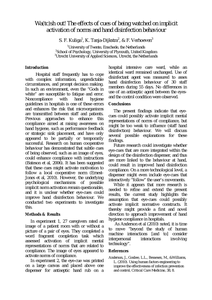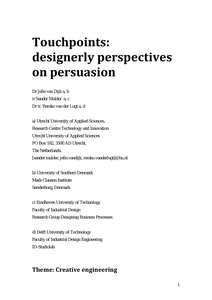Hospital staff frequently has to cope with complex information, unpredictable circumstances, and prompt decision making. In such an environment, even the “Gods in white” are susceptible to fatigue and error. Noncompliance with hand hygiene guidelines in hospitals is one of these errors and enhances the risk that microorganisms are transmitted between staff and patients. Previous approaches to enhance this compliance aimed at raising awareness on hand hygiene, such as performance feedback or strategic sink placement, and have only appeared to be partially or temporarily successful. Research on human cooperative behaviour has demonstrated that subtle cues of being observed, such as an image of eyes, could enhance compliance with instructions (Bateson et al, 2006). It has been suggested that these cues might activate motivation to follow a local cooperative norm (Ernest-Jones et al, 2010). However, the underlying psychological mechanisms of possible implicit norm activation remain questionable, and it is unclear whether eye-cues could improve hand disinfection behaviour. We conducted two experiments to investigate this
DOCUMENT

Introduction Physical activity levels of children with disabilities are low, as these children and their parents face a wide variety of both personal and environmental barriers. Behavior change techniques support pediatric physical therapists to address these barriers together with parents and children. We developed the What Moves You?! intervention Toolkit (WMY Toolkit) filled with behavioral change tools for use in pediatric physical therapy practice. Objective To evaluate the feasibility of using the WMY Toolkit in daily pediatric physical therapy practice. Methods We conducted a feasibility study with a qualitative approach using semi-structured interviews with pediatric physical therapists (n = 11). After one day of training, the pediatric physical therapists used the WMY Toolkit for a period of 9 weeks, when facilitating physical activity in children with disabilities. We analyzed the transcripts using an inductive thematic analysis followed by a deductive analysis using a feasibility framework. Results For acceptability, pediatric physical therapists found that the toolkit facilitated conversation about physical activity in a creative and playful manner. The working mechanisms identified were in line with the intended working mechanisms during development of the WMY Toolkit, such as focusing on problem solving, self-efficacy and independence. For demand, the pediatric physical therapists mentioned that they were able to use the WMY Toolkit in children with and without disabilities with a broad range of physical activity goals. For implementation, education is important as pediatric physical therapists expressed the need to have sufficient knowledge and to feel confident using the toolkit. For practicality, pediatric physical therapists were positive about the ease of which tools could be adapted for individual children. Some of the design and materials of the toolkit needed attention due to fragility and hygiene. Conclusion The WMY Toolkit is a promising and innovative way to integrate behavior change techniques into pediatric physical therapy practice.
LINK
Aan de hand van de ‘customer journey’ beschrijven we in dit rapport welke barrières mensen met een beperking ervaren voor, tijdens en na de reis en hoe de reisindustrie hierop kan inspelen. In dit rapport vatten we de belangrijkste bevindingen samen van vijf onderzoeksrapporten en ons literatuuronderzoek.
DOCUMENT

Background: Osteoarthritis (OA) is a chronic disease primarily affecting older adults, mainly impacting the hip and knee joints. The increasing prevalence of OA contributes to rising healthcare demands and costs. Current OA treatment guidelines emphasize the importance of self-management education and guidance, particularly in promoting physical activity and weight management. In addition, improving sleep is crucial for managing OA. Developing effective self-management interventions necessitates a comprehensive understanding of the factors that facilitate these behaviors. Especially for changing health behaviors, it is important to focus on psychosocial factors. Therefore, this systematic review aimed to identify the psychosocial factors associated with physical activity, weight management, and sleep in adults with hip and/or knee OA. Methods: Five databases (PubMed, Embase, CINAHL, PyschINFO, Web of Science) were searched for observational studies reporting statistics on the association between psychosocial determinants and physical activity, weight management, or sleep in people with OA. The methodological quality was assessed using the Quality Assessment Tool for Observational Studies of the National Heart, Lung, and Blood Institute. After screening 5,812 articles, 31 studies were included for analysis. Results: The results showed that intention, self-efficacy, and willpower beliefs were positively associated with physical activity. Kinesiophobia, pain catastrophizing and pain-related fear were negatively associated with physical activity. Depressive symptoms, negative affect, pain catastrophizing, and low willpower beliefs were associated with poor weight management. Anxiety, depression, pain anxiety, and post-traumatic stress disorder were related to poor sleep behavior. Conclusions This review enhances the understanding of the psychosocial factors underlying physical activity, weight management and sleep in OA. These insights are valuable for developing tailored behavior change interventions aimed at improving physical activity, weight management and sleep in patients with hip and/or knee OA.
MULTIFILE

This report summarises the findings of an international study of the ethical challenges faced by social workers during the Covid-19 pandemic, undertaken during 6th-18th May 2020. 607 responses from 54 countries were received via an online survey, additional interviews and local surveys. Six key themes relating to social workers’ ethical challenges and responses were identified: 1. Creating and maintaining trusting, honest and empathic relationships via phone or internet with due regard to privacy and confidentiality, or in person with protective equipment. 2. Prioritising service user needs and demands, which are greater and different due to the pandemic, when resources are stretched or unavailable and full assessments often impossible. 3. Balancing service user rights, needs and risks against personal risk to social workers and others, in order to provide services as well as possible. 4. Deciding whether to follow national and organisational policies, procedures or guidance (existing or new) or to use professional discretion in circumstances where the policies seem inappropriate, confused or lacking. 5. Acknowledging and handling emotions, fatigue and the need for selfcare, when working in unsafe and stressful circumstances. 6. Using the lessons learned from working during the pandemic to rethink social work in the future.
LINK
Buildings with innovative technologies and architectural solutions are needed as a means of support for future nursing homes alongside adequate care services. This study investigated how various groups of stakeholders from healthcare and technology envision the nursing home of the future in the presumed perspective of residents, care professionals and technical staff. This qualitative study gathered data via ten simultaneous monodisciplinary focus group sessions with 95 professional stakeholders. The sessions yielded eight main themes: person and well-being; relatives and interaction; care technology; safety and security; interior design, architecture and the built environment; vision and knowledge; communication; and maintenance and operation. These themes can be used for programming future nursing homes, and for prioritising design and technological solutions. The views between the groups of stakeholders are to a large extent similar, and the personal needs of the residents are the most prominent factor for practice.
DOCUMENT

Analyse the results from a representative selection of the supply chain studies for school feeding programmes in Kenya, Ghana and Mali, and make specific suggestions for interventions that can efficiently include SHF in the supply chains.
DOCUMENT

While consumers have become increasingly aware of the need for sustainability in fashion, many do not translate their intention to purchase sustainable fashion into actual behavior. Insights can be gained from those who have successfully transitioned from intention to behavior (i.e., experienced sustainable fashion consumers). Despite a substantial body of literature exploring predictors of sustainable fashion purchasing, a comprehensive view on how predictors of sustainable fashion purchasing vary between consumers with and without sustainable fashion experience is lacking. This paper reports a systematic literature review, analyzing 100 empirical articles on predictors of sustainable fashion purchasing among consumer samples with and without purchasing experience, identified from the Web of Science and Scopus databases.
MULTIFILE

Our approach builds on both the design traditions of participatory design and embodiment. We attempt to connect these traditions to the existing body of knowledge on persuasion. First we describe some basic theoretical concepts and infer how they influence persuasive design. Then we present a basic framework with which we intend to address the different abstraction layers involved. Finally, we discuss the principal differences and meeting areas between the disciplines of design and communication, ending up with some considerations for a persuasion toolbox that is intended to help communication professionals and designers effectively design behavior change interventions that fit the messy lives of people in the real world
DOCUMENT

Background: During hospitalization patients frequently have a low level of physical activity, which is an important risk factor for functional decline. Function Focused Care (FFC) is an evidencebased intervention developed in the United States to prevent functional decline in older patients. Within FFC, nurses help older patients optimally participate in functional and physical activity during all care interactions. FFC was adapted to the Dutch Hospital setting, which led to Function Focused Care in Hospital (FFCiH). FFCiH consists of four components: (1) ‘Environmental and policy assessment’; (2) ‘Education’; (3) ‘Goal setting with the patient’ and (4) ‘Ongoing motivation and mentoring’. The feasibility of FFCiH in the Dutch hospital setting needs to be assessed. Objective: Introduce FFCiH into Dutch hospital wards, to assess the feasibility of FFCiH in terms of description of the intervention, implementation, mechanisms of impact, and context. Design: Mixed method design Setting(s): A Neurological and a Geriatric ward in a Dutch Hospital. Participants: 56 Nurses and nursing students working on these wards. Methods: The implementation process was described and the delivery was studied in terms of dose, fidelity, adaptions, and reach. The mechanisms of impact were studied by the perceived facilitators and barriers to the intervention. Qualitative data were collected via focus group interviews, observations, and field notes. Quantitative data were collected via evaluation forms and attendance/participation lists. Results: A detailed description of FFCiH in terms of what, how, when, and by whom was given. 54 Nurses (96.4%) on both wards attended at least 1 session of the education or participated in bedside teaching. The nurses assessed the content of the education sessions with a mean of 7.5 (SD 0.78) on a 0–10 scale. The patient files showed that different short and long-term goals were set. Several facilitators and barriers were identified, which led to additions to the intervention. An important facilitator was that nurses experienced FFCiH as an approach that fits with the principles underpinning their current working philosophy. The experienced barriers mainly concern the implementation elements of the FFCiH-components ‘Education’ and ‘Ongoing motivation and mentoring’. Optimizing the team involvement, improving nursing leadership during the implementation, and enhancing the involvement of patients and their family were activities added to FFCiH to improve future implementation. Conclusions: FFCiH is feasible for the Dutch hospital setting. Strong emphasis on team involvement, nursing leadership, and the involvement of patients and their families is recommended to optimize future implementation of FFCiH in Dutch hospitals.
DOCUMENT
